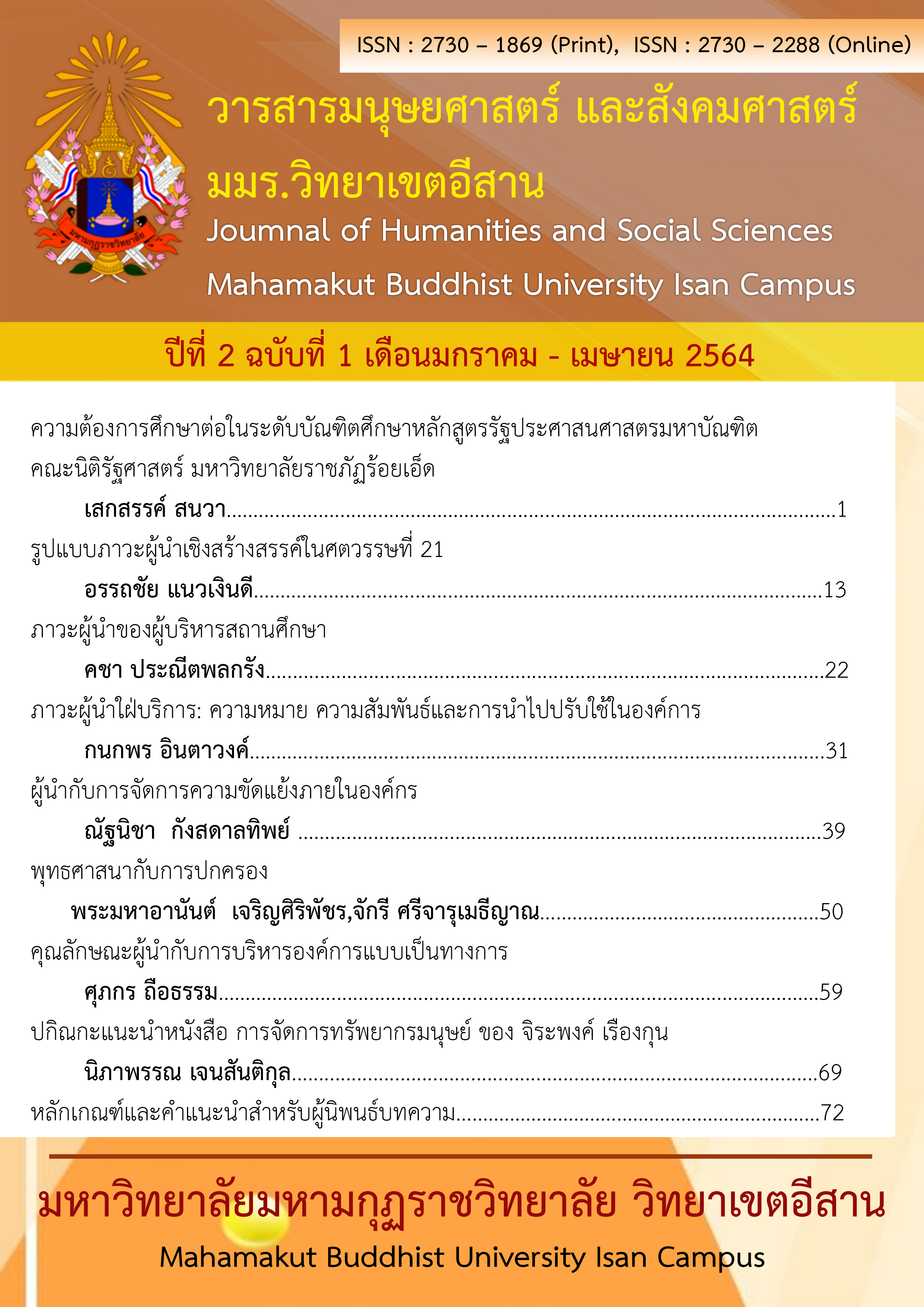The Characteristics of Leaders with Management Formal Organization
Keywords:
Characteristics; Leaders; Management; Formal OrganizationAbstract
The objective of this academic article was to describe characteristics of leaders with management formal organization. The results of the study showed that leaders were important to management, organizational strategy, implementation of the strategic plan and organizational management by leaders should have ten attributes that compose of endeavor, perseverance, perseverance, motivation and determination, enthusiasm and skill, take responsibility and take risks, have self-confidence, be honest, good human relations and good health, intelligence, ideals and creativity, a good personality. Therefore, leaders should change to bring about change in the organization and develop the organization to be successful.
References
กุลธิดา มาลาม. (2563). ภาวะผู้นำของผู้บริหารโครงการในศตวรรษที่ 21 กับการผลิตบริการสาธารณะในยุค Thailand 4.0. วารสารนวัตกรรมการศึกษาและการวิจัย, 4 (3), 189-204.
จิระพงค์ เรืองกุน. (2556). การเปลี่ยนแปลงองค์การ: แนวคิด กระบวนการ และบทบาทของนักบริหารทรัพยากรมนุษย์. วารสารปัญญาภิวัฒน์, 5 (1), 194-203.
นงลักษณ์ สุทธิวัฒนพันธ์. (2537). การพัฒนาบุคลิกภาพ ผู้นำและผู้บริหาร. กรุงเทพฯ: ฝ่ายงานพิมพ์บริษัท เอ็น.เจ. โปรโมชั่น จำกัด.
นิภาพรรณ เจนสันติกุล และไชยณัฐ ดำดี. (2556). การเปรียบเทียบรูปแบบการพัฒนาภาวะผู้นำเพื่อส่งเสริมศักยภาพของทรัพยากรมนุษย์. วารสารดำรงราชานุภาพ, 13 (47), 54-62.
มุกดา สุนทรรัตน์. (2547). การสร้างคนไปสู่ผู้นำขององค์กรในอนาคต. กรุงเทพฯ: ไทยวัฒนาพานิช.
รุ่งรัตน์ พลชัย. (2563). ภาวะผู้นำกับการบริหารในยุคดิจิทัล. วารสารมนุษยศาสตร์และสังคมศาสตร์ มมร. วิทยาเขตอีสาน, 1 (3), 53-62.
เรมวล นันท์ศุภวัฒน์. (2541). ภาวะผู้นำในองค์การ. เชียงใหม่: นพบุรีการพิมพ์.
วาณิชา โกวิทานนท์. (2558). การพัฒนารูปแบบการองค์การที่มีสมรรถนะการทำงานสูงเพื่อรองรับการเข้าสู่ประชาคมเศรษฐกิจอาเซียน กรณีศึกษา องค์การบริหารส่วนจังหวัดสมุทรสงคราม. วารสารบริหารการวิจัยและการพัฒนา, 5 (2), 34-47.
สถาบันดำรงราชานุภาพ. (ม.ป.ป.). องค์กรสมัยใหม่ที่มีขีดความสามารถสูง. ม.ป.ท.
สมชาย เทพแสง. (ม.ป.ป.). ภาวะผู้นำแห่งการเรียนรู้ : รูปแบบของภาวะผู้นำสมัยใหม่. ม.ป.ท.
สุนิสา ช่อแก้ว. (2563). การบริหารทรัพยากรมนุษย์: แนวคิด กระบวนการ เครื่องมือและกรณีศึกษา. กรุงเทพฯ: คณะรัฐศาสตร์ มหาวิทยาลัยธรรมศาสตร์.
เสกสรรค์ สนวา ฉัตรณรงค์ศักดิ์ สุธรรมดี และวิไลลักษณ์ ขาวสอาด. (2561). คุณลักษณะของผู้นำองค์การภาครัฐสมัยใหม่. วารสารมนุษยศาสตร์และสังคมศาสตร์ มหาวิทยาลัยราชภัฏสุรินทร์, 20 (พิเศษ), 399-411.
เสน่ห์ จุ้ยโต. (2551). องค์การสมัยใหม่. นนทบุรี: มหาวิทยาลัยสุโขทัยธรรมาธิราช.
สำนักงานสภาพัฒนาการเศรษฐกิจและสังคมแห่งชาติ. (2563). แผนแม่บทภายใต้ยุทธศาสตร์ชาติ (20) ประเด็น การบริการประชาชนและประสิทธิภาพภาครัฐ พ.ศ. 2561 – 2580. กรุงเทพฯ: สำนักงานสภาพัฒนาการเศรษฐกิจและสังคมแห่งชาติ.
อภิรักษ์ บุปผาชื่น. (2563). ภาวะผู้นำเชิงนวัตกรรม: การขับเคลื่อนองค์การสู่ความเป็นเลิศ. วารสารนวัตกรรมการศึกษาและการวิจัย, 4 (3), 205-216.
Deborah, K. (2002). The Changing Shape of Leadership. Educational Leadership, 59 (8), 61-63.
Dockthaisong, B. (1992). Management Organization. Bangkok: The Foundation for Human Resources Development and Rural Technology.
Jongwisarn, R. (2008). Transformational Leadership. Office of Human Resource Management University of the Thai Chamber of Commerce.
Senge, P. (1990). The Fifth Discipline: The art & practice of the learning organization. London: Century Business.
Sutamdee, C and Sonwa, S. (2017). Leadership Behavior and Organizational Change. Journal of Social Science, Law and Politics, 1 (2), 104 – 124.
Yawirat, N. (2009). Leadership and Strategic Leaders. (7thed). Bangkok: Trip Group of Companies.



